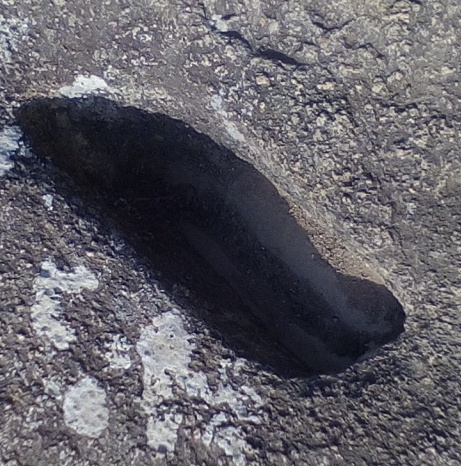Title of the work
Country of the First Edition
Country/countries of popularity
Original Language
Country of the Recording of the Story for the Database
Full Date of the Recording of the Story for the Databasey
More Details of the Recording of the Story for the Database
Genre
Myths
Target Audience
Crossover
Cover

Footprint of Lunga on the Rock he landed on at Luh village in Ndu Sub- Division, North West Region of Cameroon (photograph by Divine Che Neba and Ngafi Nyeh, June 17, 2016).
Author of the Entry:
Divine Che Neba, University of Yaoundé 1, nebankiwang@yahoo.com
Peer-reviewer of the Entry:
Eleanor A. Dasi, University of Yaoundé 1, wandasi5@yahoo.com
Elizabeth Hale, University of New England, ehale@une.edu.au

Gideon Ngafi (Storyteller)
Age of Narrator: 58 (in 2017)
Social status: Traditional ruler
Profession: Teaching
Language of narration: Limbum
Bio prepared by Divine Che Neba, University of Yaoundé 1, nebankiwang@yahoo.com
Origin/Cultural Background/Dating
Background: Ndu subdivision is found in the Donga Mantung Division of North West Cameroon. It has an estimated population of 85,000 people, the majority of whom hail from 3 main clans - the Wiya Clan, the Warr Clan and the Tang Clan – and speak the Limbum language. A large number of the rural population practice farming and cattle rearing given the rich soil and sufficient rain. It has the largest tea plantation in Cameroon –the Ndu Tea Estate. The people respect traditional authority under the fon (king), chiefs and sub-chiefs, who are the custodians of culture. Like every other traditional grassfield kingdom, the people believe in a supreme deity assisted by other smaller gods, ancestors and spirits. That notwithstanding, some of them have embraced Christianity, which they practice alongside their traditional religions.
Summary
So many years ago, when the white man arrived the Mbum land, there lived a man called Lunga. He was one of the wisest judges and lawmakers in the kingdom. He was loved by everyone because he was a good counselor and had mythic power. One day, the king summoned all his counselors and advisers in the kingdom for a meeting.
The agenda of this meeting was simply to devise means to combat the new religion from the West. The major problem was the fact that the God of this new religion was proclaimed as being the almighty God, yet this God was not visible as was the other gods of the land. The messengers who brought the news claimed that he lived up in the sky. When the agenda was unveiled by the King, the counselors were more traumatized than the king himself. The major question was: What was the way forward? The assembly came to a consensus to visit the white man’s God and know more about him. The white men, from the west, made them to understand that this was physically impossible, as one could only see their God after death. They then sought Lunga’s help, who agreed to go on an expedition to challenge the white man’s God. He got up one morning, took his drum and spear and while singing and drumming, ascended into the sky in quest of the so-called almighty God of the White man. This was fascinating even to the whites who witnessed Lunga violating the law of gravity.
However, when Lunga got to the depth of the sky, he did not see the “almighty”. His servants claimed he had gone to visit a bereaved family. Lunga was shocked to hear that death also existed in the spiritual realm of the white man’s God. The servants told him that he could only see God after death. Thus, Lunga was obliged to return to earth.
To ensure his safe landing back on earth, the servants gave him ropes to tie himself on one end while they held the other end. They told him that as soon as his feet touched the earth, he should violently shake the ropes for them to cut. But Lunga was very unlucky as he did not even reach half of his journey back to earth when a violent wind shook the rope and the angels thought he had arrived so they cut the rope. As would be expected, Lunga’s descent was faster than he could ever imagine, but being a superhuman being, he landed on a rock, still alive, with his spear and drum in his hand. To this day, the footprints of Lunga are still on the rock in the Mbum land in Cameroon.
Analysis
The idea of humans and demi-gods flying into the sky is universal in most world mythologies.
The mythic Lunga, in Mbum (Cameroon) mythology recalls the myth of Icarus, son of Daedalus, who flew into the sun on his attached wings of feathers stuck together with wax, which melted in the heat of the sun. Unlike Lunga who fell on a rock and survived, Icarus fell into the sea and perishes.
Further Reading
Wiklund, Nils, The Icarus Complex, Lund: Doxa, 1978.
Addenda
Method of data collection: Note-taking.
Researcher: Divine Che Neba.
Research Assistant translator: Ngafi Nyeh.
Editor: Eleanor A. Dasi.


